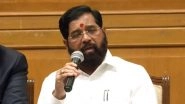New Delhi, Jan 16 (PTI) The Centre has urged states participating in the Atal Bhujal Yojana to scale up activities to cover all Gram Panchayats and compare outcomes between Atal Jal and non-Atal Jal areas to evaluate the scheme's effectiveness.
This call was made during the seventh National Level Steering Committee (NLSC) meeting held in the capital, where officials highlighted the scheme's role in promoting sustainable groundwater management through community participation.
Also Read | 8th Pay Commission Approved by PM Narendra Modi: Here's Timeline and Key Facts.
The seventh meeting of the Atal Bhujal Yojana (Atal Jal), marking the scheme's fifth year of implementation, was chaired by Debashree Mukherjee, Secretary of the Department of Water Resources, River Development, and Ganga Rejuvenation (DoWR, RD & GR).
Launched in 2018, Atal Bhujal Yojana aims to ensure sustainable groundwater management through community involvement and decentralised planning.
Also Read | Chhattisgarh Encounter: 12 Naxals Killed in Gun Fight With Security Forces in South Bastar.
The meeting focused on reviewing progress and strategising the future direction of this community-driven groundwater management initiative.
Subodh Yadav, Additional Secretary (Admin, IC&GW) and National Project Coordinator for Atal Bhujal Yojana, emphasised that the scheme has reached a critical juncture, where its on-ground impact must be showcased for potential upscaling.
"In the last four years, states have undertaken various initiatives under the scheme. It is now time to analyse the data, assess the on-ground impact, and measure the overall outcomes," he said.
Mukherjee highlighted the uniqueness of Atal Bhujal Yojana as a pilot initiative that has successfully onboarded communities and enhanced their awareness about groundwater management.
She encouraged participating states to expand activities to cover all Gram Panchayats and compare results from Atal Jal areas with non-Atal Jal regions to evaluate the scheme's effectiveness.
"The untied funds under Atal Jal offer states the flexibility to explore innovative technologies and activities that can later be mainstreamed based on their success," she added.
The meeting included presentations by representatives from the seven participating states, showcasing the scheme's impacts and offering cross-learning opportunities.
The World Bank's Task Team Leader presented the findings of a review mission, identifying gaps in implementation and areas for improvement.
The committee emphasised utilizing the extensive data generated under the scheme for meaningful analysis and decision-making. It also encouraged states to focus on integrating innovative technologies for sustainable water resource management.
The meeting was attended by senior officials from participating states, representatives from various ministries and departments, World Bank officials, and members of the National Program Management Unit (NPMU).
(The above story is verified and authored by Press Trust of India (PTI) staff. PTI, India’s premier news agency, employs more than 400 journalists and 500 stringers to cover almost every district and small town in India.. The views appearing in the above post do not reflect the opinions of LatestLY)













 Quickly
Quickly


